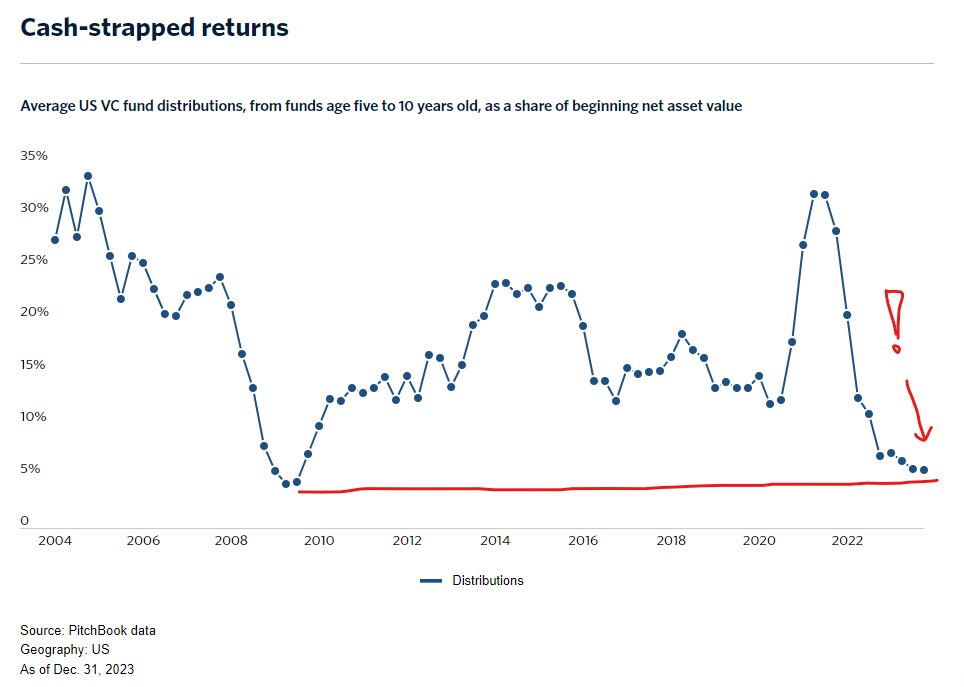
Hello, and happy Sunday (and Dune 2 release weekend)! We hope you’ve already mainlined some Arrakis-grade spice. Be merry, Zendaya fans: We hear she has more than two lines of dialogue this time. Additional merriment is due to Bitcoin holders, as the price is at an all-time high. Now, stop furiously refreshing your Coinbase account, and read something important—our stories.
Our stories
🎧 Can Gemini 1.5 Pro Beat Our Best Stock Trade? by Dan Shipper/Chain of Thought: Money is the root of all evil, so sayeth the Lord. This is true! Also, we would like to have a little bit more evil in our lives, if you catch our drift. One of the things most requested from our readers is how they can use AI to make more moolah. In this episode of his podcast, Dan does a live stock-picking session with VC Jesse Beyroutey to see if they can figure out how ChatGPT will make you rich. Watch this if you want to do the same. 🔏Paid subscribers have access to the episode transcript.
“Reddit: The Internet’s Bellwether” by Evan Armstrong/Napkin Math: Reddit is a special place on the internet that happens to be a mediocre business. However, its recent S-1 document revealed something interesting: It could potentially build a business licensing user data to AI companies. Is this the future, or a fiction? Read this to learn about this new potential revenue stream for companies. 🎧 Listen to an audio version of this essay on Spotify.
“Don’t Be Scared to Take on a Monopoly” by Nir Zicherman: The best advice sounds dumb when you first hear it. A startup taking on an all-powerful monopoly is really stupid advice—until it works. Nir Zicherman did just that by taking on powerful incumbents as a co-founder of podcasting startup Anchor and, later, as the vice president of audiobooks at Spotify. He argues that targeting monopolies is the way that startups can win. Read this if you're trying to figure out when startups have an edge.
“What the Media Is Getting Wrong About AI” by Evan Armstrong/Napkin Math: We aren’t Gawker or tech-news TMZ. But when people are wrong, we have a duty to point it out. This is especially true in the case of technology like AI. AI may end up having more of an impact than any other tech in the last 20 years, but whether that impact is positive or negative is yet to be determined. However, many mainstream writers are getting the fundamentals wrong. Read this to get a good understanding of where AI is at and where it is going.
🎧 “How a Hollywood Director Uses AI to Make Movies” by Dan Shipper/Chain of Thought: We keep beating the drum around here that AI tooling empowers more people to be more creative. This is especially true with cinema, an art form previously constrained by the amount of capital it requires. In this episode of How Do You Use ChatGPT?, Dan interviews Hollywood director Dave Clark about how to make compelling films with AI tools. Watch this to see where you can apply video AI to your creative practice. 🔏 Paid subscribers have access to the episode transcript.
The backchannel
In last week’s Sunday Digest, Dan said that he thought that Google’s AI image generation tool snafu would be forgotten just like Microsoft’s Sydney/Bing chatbot fiasco. Here’s a response:
“I don’t think it’ll be forgotten. It might even be the beginning of the end for Google...Not [because] it was such a big catastrophe but it was the first time everyone was able to socially acceptably express anger that has been slowly growing for years, plus fear of bureaucratic hall-monitor god-AGI is terrifying. The difference is AI is taken a lot more seriously now. Also, I think Sydney hit Microsoft’s credibility a lot. They’ve done no interesting AI work since, basically. Microsoft has a giant stake in OpenAI so it doesn’t need their own AI to work—their own AI is a side thing. I think there’s a 20 percent chance this ends up leading to the functional end of Google. An embarrassment for them in this area could be existential.” —An AI researcher
Want to chat? DM Dan or Evan on X.
Chain of links
Oui, oui, we raised ze Microsoft money: Open-source AI pioneer Mistral simultaneously released a new model that is sort of competitive with GPT4 and announced a channel partnership with Microsoft. We are now at the point of the cycle where AI startups have to think about paltry things like “sales” or “how do we make money.” Evan pointed out earlier this week that these types of AI partnerships are worthy of scrutiny.
Robot karaoke. Generative AI video startup Pika released a model update that allows the people in its generated videos to have moving lips. This mostly felt like a response to OpenAI’s mind-blowing Sora videos. Pika’s video quality isn’t quite believable, but it is close—raising questions on the potential for misinformation. Most of the world isn’t ready for what happens when these models are live and publicly accessible.
Generative DNA. In fun science news, Arc Institute, an independent science lab funded with $650 million from the well-to-dos of Silicon Valley, released a model to understand and create DNA, RNA, and protein sequences—the building blocks of life. This is the AI type work that changes everything.
Is Grok that bad? Elon Musk was a co-founder and primary funder of an open-source, non-profit research lab called OpenAI in 2015. Three years later he departed the organization in a huff, leaving Sam Altman and Greg Brockman in charge. The details of why are still unclear, but what happened next was obvious: OpenAI switched from open-source, nonprofit to a ClosedAI, Scrooge McDuck-levels-of-profit-type organization. Musk has responded by tweeting grumpy things, starting a competitor called Grok, and, on March 1, suing OpenAI. Our rule of thumb: If you are suing a competitor, it's because your product sucks. Better to win just by making something better.
“Please hold, you are now unemployed.” European tech giant Klarna built customer service agents using tech from OpenAI. The AI is doing the equivalent work of 700 full-time agents, and its customer satisfaction score is on par with human agents. Customers solve their problems in two minutes, as compared to 11 minutes previously, and it’s estimated to lead to a $40 million profit improvement for the company in 2024. Customer service jobs are soul-sucking and have incredibly high attrition, but it’s important as a society that we establish norms for helping people adapt to the new reality that this technology is creating—whether through new job training or generous severance packages. —Dan Shipper and Evan Armstrong
The napkin math
Apple unplugged the car. Since 2015, Apple has spent $10 billion developing an electric vehicle, burning through managers and undergoing multiple strategic shifts. Now the company has finally called it quits on the project and laid off about 2,000 employees, with some expected to work on Generative AI projects. This initiative never made any sense to me. The only ecosystem advantages Apple would bring is Carplay, and even then the strategic connection is tenuous. To my eyes, this was always, “Big market size makes executives go dumb dumb.”
Venture capital loses the battle with racism. Black founders received ever-less funding in 2023—a total of $705 million across 191 deals, which is less than 0.5 percent of all venture funding, down from $2.4 billion in 2022. It is easy to point fingers at VCs, but this is a systemic problem. Black tech founders are rare, and while some VCs will write checks before there is even an idea, the majority of investors can’t until a company exists. The only real way to solve this problem is to give the many talented Black people in our industry funding before they have an idea.
Benioff, the bullshitter. Nobody in tech actually believes that Salesforce has a differentiated AI product. I still remember the company claiming that it was gonna work AI magic… in 2017…with IBM…that did not happen. During its earnings calls last week, the company delivered lackluster results, so CEO Marc Benioff delivered an epic 20-minute pitch that moved the stock from being down 4.5 percent to up .3 percent. Impressive.
The $15 billion man. Snowflake CEO Frank Slootman announced his retirement and elevated a CEO who has never worked in enterprise SaaS before (which is wild on its own). Slootman was so highly regarded that the stock immediately tanked more than 20 percent, wiping out $15 billion in market cap. When I’ve left my jobs, most people have felt relieved.
Oh, no, I like a crypto thing. Telegram, a popular messaging app that has some social media features baked in, announced a 50/50 revenue split with creators whose channels have ads. Payment will be made exclusively in Telegram’s native token. This is an obvious use case for crypto—there 800 million users are spread across 100 countries. Rather than trying to figure out payouts in currency native to each country, it can just use crypto. Wow, crypto does have a use case! In other news, pigs have been spotted flying around Manhattan. —EA
For the love of charts
It’s put-up-or-shut-up time for VCs. Data from Pitchbook shows that VCs are returning about as much money to investors as they did at the nadir of the financial crisis—which is to say, very little.
Source: Pitchbook.
As a share of net asset value, or NAV (i.e., the value VCs assign to their investments), fund returns are at a 15-year low. That’s not because VCs are hiding cash in mattresses. It’s because the end of the capital conveyor belt—M&A or IPO—is jammed up, and there is no cash to distribute. Whatever the reason, though, generating real returns to investors is the name of the game, so if VCs aren’t returning money to their LPs, it creates at least two concerns: (1) valuations aren’t nearly as high as VCs think or hope, because no one is buying at the prices they’re selling; and (2) VCs won’t be able to raise new funds (or call funds already raised) because LPs also don’t have the cash—all their money is still tied up in venture funds that aren’t returning money. Bigger picture, everyone knows that illiquidity is part of the deal, and there’s no expectation that VCs return money like clockwork, nor is it cause for panic if they don’t. Eventually, though, it becomes put-up-or-shut-up time, and that time is fast approaching. —Moses Sternstein
The examined life
Beautiful business writing. At Every, we talk about our north star being a stock report that could win a Nobel prize for literature—something analytical, rigorous, and beautiful. This article from Harvard Business Review is just that: It has the big idea (a theory about why software makes more money the more it sells) and the boon of being edited by one of America’s greatest authors—Cormac McCarthy. The prose is succinct, punchy, and energetic, just like McCarthy. Read this to see beautiful business writing. —EA
Beautiful writing, period. If you know my writing, you know that I can’t stop talking about Annie Dillard. I recently discovered a new (to me) book of hers that I can’t stop rereading: For the Time Being. No other writer captures the vast scope of human existence—and its most important questions—like Dillard does in this book. If you want to examine your life, it’s a great place to start. —DS
Eye candy
German design, Apple implementation. Dieter Rams was a 1950s German designer whose work at consumer company Braun echoes in Silicon Valley today. His principles are elegant, his taste refined and smooth—qualities that neatly translated into Apple’s design philosophy. Under the guidance of former lead designer Jony Ive, Apple has mirrored Rams's ideals in its product lineup, from the sleek, minimalist design of the iPod to the functional elegance of the iMac. Check out some more visual comparisons. —Lucas Crespo
Source: Every illustration/Braun and Apple.
That’s all for this week! Be sure to follow Every on X at @every and on LinkedIn. Was this newsletter forwarded to you? Sign up to get it in your inbox.
Find Out What
Comes Next in Tech.
Start your free trial.
New ideas to help you build the future—in your inbox, every day. Trusted by over 75,000 readers.
SubscribeAlready have an account? Sign in
What's included?
-
Unlimited access to our daily essays by Dan Shipper, Evan Armstrong, and a roster of the best tech writers on the internet
-
Full access to an archive of hundreds of in-depth articles
-
-
Priority access and subscriber-only discounts to courses, events, and more
-
Ad-free experience
-
Access to our Discord community





Comments
Don't have an account? Sign up!
so much fun to read - even from a super basic bakers perspective. Thanks for your great work